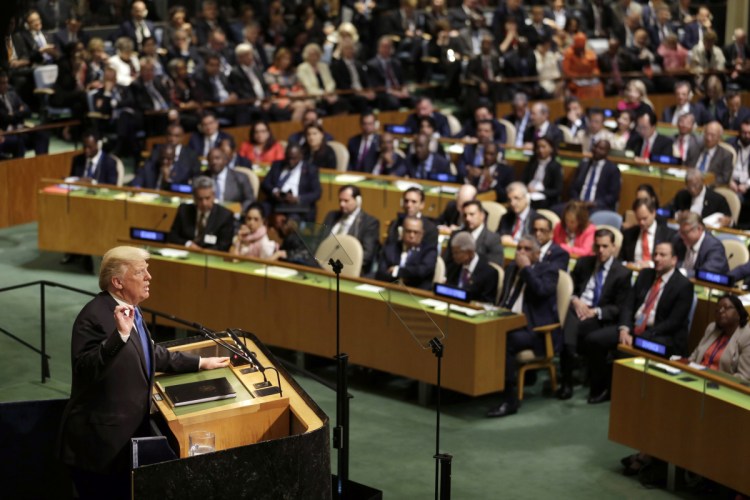WASHINGTON — President Trump had a stormy debut at the annual United Nations gathering of world leaders last September.
From the podium of the packed General Assembly, he blasted North Korean dictator Kim Jong Un as “Rocket Man,” threatened to “totally destroy” North Korea, and warned of global peril from “loser terrorists” and the “wicked few.”
When Trump returns to the U.N. this week, he will claim that his brash diplomacy has led to a series of foreign policy successes, aides say, including an emerging detente with North Korea, expanding protection for U.S. trade and other interests, and putting Islamic State on the run.
During his four-day visit to New York, the president will address the General Assembly, chair the Security Council for the first time and speak at a conference on narcotics. Amid a flurry of diplomatic receptions, he also will hold private meetings with the leaders of seven countries, including Japan, France and Great Britain.
Trump’s disruptive approach to foreign policy includes a disdain of international institutions, including the U.N. He repeated his doubts before his arrival Sunday night by saying the world body had “not lived up to” its potential.
“It’s always been surprising to me that more things aren’t resolved,” Trump said in a weekend video message, “because you have all of these countries getting together in one location but it doesn’t seem to get there. I think it will.”
Secretary of State Michael R. Pompeo signaled Sunday that Trump would claim credit for lowering the nuclear threat from North Korea – even though Pyongyang has yet to make any substantive moves toward eliminating its nuclear arsenal or ballistic missiles, or even providing an inventory of them.
“We’re continuing to make progress,” Pompeo said on “Fox News Sunday,” citing North Korea’s suspension of nuclear or missile tests since last year, and what he called “deep discussions” about denuclearization.
Nikki Haley, the U.S. ambassador to the United Nations, was more circumspect, noting, “We are far from reaching the end of this.
“We have got to make sure we enforce sanctions because that’s what brought them to the table in the first place,” she said on CNN’s “State of the Union.” “And I think that’s what we’re going to continue to do.”
Haley also indicated that Trump, who blasted Iran in his speech last year to the world body, would again take a tough line, but backed away from weekend comments by Trump lawyer Rudolph W. Giuliani suggesting that Washington was sympathetic to those who want to see Iran’s leadership toppled.
“Look, the United States is not looking to do a regime change in Iran. We’re not looking to do regime change anywhere,” she said. Some analysts expect Trump to deliver a less fiery speech this year, if only because his top target has changed. He now boasts of his “warm” feelings for Kim, whom he met in June during a summit in Singapore, and still hopes to revive the stalled denuclearization talks.
Iran may bear the brunt of Trump’s harshest rhetoric this year for what the administration considers its malign behavior, including support for militants in Yemen, Lebanon, Iraq and elsewhere. According to a senior administration official, Trump plans to repeat his claim that the Iran nuclear deal “failed” – despite continued reports from the U.N. nuclear watchdog that Iran is complying with it.
He will face a more jaded audience than last year, however. Many leaders have sized up Trump’s blustery rhetoric, are wary of the policy havoc he can wreak, and are finding ways to navigate with or around him, diplomats say.
Over the last year, Trump has disrupted the world order by starting trade conflicts with China and the European Union, and by offering lavish praise for Russian President Vladimir Putin – who will not be at the U.N. this week – even as the special counsel investigation into Russian interference in the 2016 campaign continues to cloud the White House.
Some experts see the decline of U.S. political influence around the globe in the Trump era.
“Many countries are looking elsewhere,” said Stewart M. Patrick, senior fellow for global governance at the nonpartisan Council on Foreign Relations. “If the United States draws back, it’s not as if the vacuum isn’t filled. Increasingly it is being filled by China.”
U.N. Secretary-General Antonio Guterres, who will meet privately with Trump on Tuesday, recently reflected publicly on the United States’ shrinking ability to influence world events.
Last year, Guterres welcomed Trump to the U.N. with a public expression of gratitude for Trump’s insistence that other countries contribute more to its coffers.
This month Guterres lamented that Trump has pushed the United States into “a number of conflicts of different natures – in relation to trade, in relation to other situations,” while disengaging from important global agreements.
The U.S. role “that was a dominant factor in international relations just a few decades ago is today less clear,” he told the Atlantic magazine.
Send questions/comments to the editors.



Success. Please wait for the page to reload. If the page does not reload within 5 seconds, please refresh the page.
Enter your email and password to access comments.
Hi, to comment on stories you must . This profile is in addition to your subscription and website login.
Already have a commenting profile? .
Invalid username/password.
Please check your email to confirm and complete your registration.
Only subscribers are eligible to post comments. Please subscribe or login first for digital access. Here’s why.
Use the form below to reset your password. When you've submitted your account email, we will send an email with a reset code.